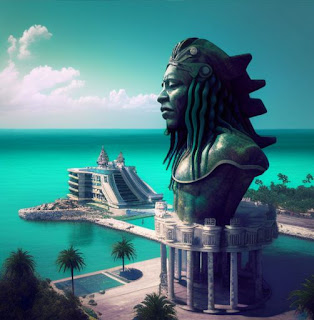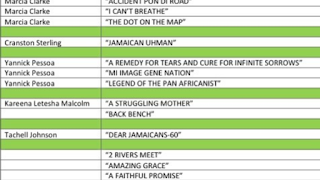"The rise of the BRICS presents both opportunities and challenges for small states like Jamaica. While the BRICS offer new avenues for trade and investment, they also pose a potential threat to traditional economic partnerships.
~Henry J. Bernard
Jamaica's potential for deeper engagement with BRICS countries and
South-South cooperation must not be ignored. The term "South-South
Agreement" encompasses the array of partnerships between countries in
the Global South designed to promote economic, social, or political
cooperation. Meanwhile, BRICS countries, as a group of fast-growing,
large economies that have the potential to become major global players
in the 21st century, are viewed as critical actors in the South-South
cooperation discourse. Developing countries often share similar
challenges and opportunities, such as poverty, inequality, and the need
for infrastructure and sustainable development. Hence, South-South
cooperation is an essential platform for developing countries to share
experiences, collaborate on solutions, and implement best practices.
BRICS is an acronym that refers to a grouping of five major emerging economies: Brazil, Russia, India, China, and South Africa. The term was coined by Jim O'Neill, an economist at Goldman Sachs, in 2001, to describe these countries as a group of fast-growing, large economies that have the potential to become major global players in the 21st century. BRICS countries are often seen as key actors in the South-South cooperation discourse. South-South cooperation refers to collaboration among developing countries in areas such as trade, investment, technology transfer, and knowledge sharing, with the aim of promoting economic growth, social development, and poverty reduction.
Jamaica, like many other developing countries, could potentially benefit from deeper relations with BRICS countries and the South-South cooperation more broadly. Developing countries often face similar challenges and opportunities, such as poverty, inequality, and the need for infrastructure and sustainable development. South-South cooperation can provide a platform for developing countries to share experiences and best practices, and to collaborate on solutions to common challenges.
In addition, Jamaica is a member of the Caribbean Community (CARICOM), which is a regional organization of 15 Caribbean countries that promotes cooperation and integration among its members. CARICOM provides a forum for South-South cooperation among its member states, and Jamaica has played an active role in promoting regional integration and cooperation in areas such as trade, education, and culture.
Jamaica has also been involved in various South-South initiatives related to climate change, including through its participation in the Alliance of Small Island States (AOSIS). AOSIS is a coalition of small island developing states (SIDS) that are particularly vulnerable to the impacts of climate change, and it aims to promote cooperation among its members on issues related to climate change mitigation, adaptation, and financing.
"South-South cooperation offers a promising alternative to traditional development assistance, as it promotes mutual learning, shared experiences, and equal partnerships. However, it also poses challenges related to political alignment, resource constraints, and institutional capacity."For Jamaica, deeper relations with BRICS countries could offer opportunities for trade, investment, and technology transfer. For example, China, one of the BRICS countries, is already a major trading partner and investor in Jamaica, with a focus on infrastructure development and tourism. India, another BRICS country, has also shown interest in increasing its economic engagement with Jamaica, particularly in areas such as renewable energy and agriculture.
"South-South Cooperation and the Future of Development Assistance: Mapping Actors and Options" by Bernhard Trautner:
Furthermore, the New Development Bank, which was established by the BRICS countries, could provide a potential source of financing for infrastructure and sustainable development projects in Jamaica. The bank aims to promote development in emerging economies, and has already approved several projects in other developing countries.
"The BRICS countries are emerging as major players in global governance, challenging the dominance of Western powers. As they continue to gain influence, they may reshape the international order in significant ways."The Monroe Doctrine is a U.S. foreign policy doctrine that dates back to the early 19th century, which stated that any intervention by external powers in the politics of the Americas is considered a hostile act against the United States. It is difficult to predict exactly how the changing global dynamics will impact the Monroe Doctrine in the long run. However, it is clear that the doctrine's relevance has declined in recent years as the United States has become less influential and other countries have gained more power in the region.
"BRICS: A New Role in Global Governance" by Paulo Roberto de Almeida
For instance, China has made significant inroads in the region, including through investments in infrastructure, such as ports and railroads, and through trade agreements. Similarly, Russia has developed closer ties with countries in the region, such as Venezuela and Cuba, and has sought to increase its military presence in the Caribbean. Meanwhile, countries such as Brazil and Mexico have become more assertive in their own foreign policies and have sought to play a greater role in regional affairs.
All of these factors suggest that the Monroe Doctrine may be less effective in limiting the influence of external powers in the Americas than it has been in the past. However, it is important to note that the United States remains a significant economic and military power in the region, and it is likely that the doctrine will continue to play some role in U.S. foreign policy for the foreseeable future. Ultimately, the impact of changing global dynamics on the Monroe Doctrine will depend on a wide range of factors, including economic, military, and political developments in the region and around the world.
"The Monroe Doctrine was a landmark policy that established the United States as a dominant power in the Western Hemisphere. While it has faced criticism for being outdated and imperialistic, its legacy continues to shape American foreign policy today."
"The Monroe Doctrine: A Retrospective" by John G. Schroeder
Today, many countries like China, Russia, India, and others in Asia, the Middle East, Africa, and South America are working to counter western dominance by developing alternatives to the west-dominated global economy, especially to the US dollar. For example, the latest BRICS summit, which saw the participation of major emerging economies, including Russia and China, was designed to challenge the G7 and signal to the world that Russia, China, and the Global South are preparing for a long fight against Western dominance. The outcome of this conflict is likely to shape the future of humanity.
In the face of global economic hegemony dominated by the West, emerging
economies like China, Russia, and India are developing alternatives to
the US dollar and challenging Western dominance. The latest BRICS summit
saw the participation of major emerging economies and signaled a
challenge to the G7, demonstrating that Russia, China, and the Global
South are preparing for a prolonged fight against Western dominance. As
the US's international decline continues, countries such as BRICS are
creating their own institutions with different values, like the Shanghai
Cooperation Organization and the Regional Comprehensive Economic
Partnership (RCEP) with China and 14 other countries in the Asia-Pacific
region.

Jamaica must explore the opportunities offered by deeper engagement with
BRICS countries and South-South cooperation, as they provide a platform
for Jamaica to share experiences, collaborate on solutions, and
implement best practices with developing countries sharing similar
challenges and opportunities.
Other Reading Material:
- "The Impact of South-South Cooperation on Jamaica" by W. Marvin Williams, in Journal of International Development (2016)
- "The BRICS: Opportunities and Challenges for Jamaica" by Henry J. Bernard, in Caribbean Journal of International Relations & Diplomacy (2016)
- "The Monroe Doctrine: A Retrospective" by John G. Schroeder, in Naval War College Review (2007)
- "BRICS: A New Role in Global Governance" by Paulo Roberto de Almeida, in Brazilian Journal of Political Economy (2014)
- "South-South Cooperation and the Future of Development Assistance: Mapping Actors and Options" by Bernhard Trautner, in Journal of International Development (2016)
These sources may offer additional insights and perspectives on Jamaica's potential engagement with BRICS countries and the concept of South-South cooperation.
#Jamaica #SouthSouthCooperation #BRICS #GlobalSouth #development #partnerships #trade #investment #technologytransfer #climatechange #regionalintegration #smallislanddevelopingstates #renewableenergy #NewDevelopmentBank #USforeignpolicy #globalgovernance #economicgrowth #sustainabledevelopment #bestpractices #collaboration #equality #mutualbenefit #institutionalobstacles #challenges #opportunities #coherence #coordination #expertise #resources




















%20%E2%80%A2%20Instagram%20photos%20and%20videos.png)
%20%E2%80%A2%20Instagram%20photos%20and%20videos.png)


%20%E2%80%A2%20Instagram%20photos%20and%20videos.png)
%20%E2%80%A2%20Instagram%20photos%20and%20videos.png)
%20%E2%80%A2%20Instagram%20photos%20and%20videos.png)
%20%E2%80%A2%20Instagram%20photos%20and%20videos.png)
%20%E2%80%A2%20Instagram%20photos%20and%20videos.png)